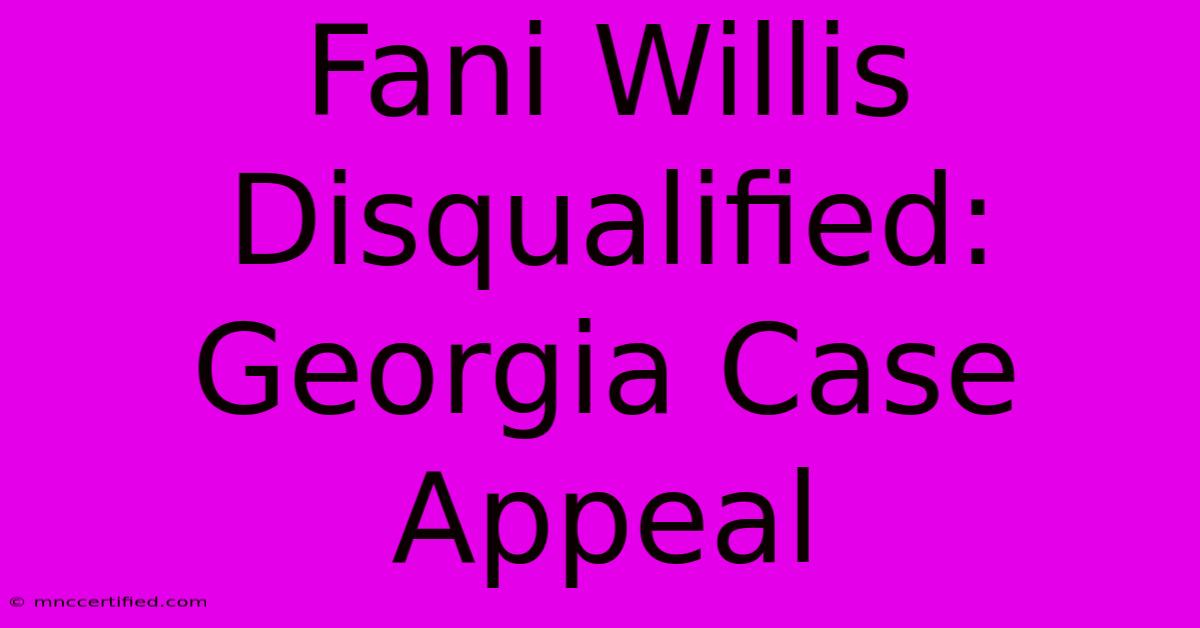Fani Willis Disqualified: Georgia Case Appeal

Table of Contents
Fani Willis Disqualified: Examining the Georgia Case Appeal
The ongoing legal battle surrounding Fulton County District Attorney Fani Willis and the Georgia election interference case has taken a dramatic turn with calls for her disqualification. This article explores the arguments surrounding these appeals, the potential implications, and the broader context of the case. We'll delve into the legal arguments, the political ramifications, and what the future might hold for this high-profile prosecution.
The Arguments for Disqualification: A Deep Dive
The appeals for Fani Willis' disqualification center around claims of prosecutorial misconduct and conflicts of interest. Specific allegations vary, but common themes include accusations of:
-
Bias and Prejudicial Conduct: Critics argue that Willis has demonstrated bias against the defendants, hindering their right to a fair trial. This often involves citing public statements made by Willis prior to and during the investigation and indictment. The argument hinges on whether these statements demonstrate a predetermined outcome, impacting the impartiality of the prosecution.
-
Violation of Defendant's Rights: Appeals may contend that Willis' actions have violated the defendants' constitutional rights, such as the right to due process and a fair trial. This could encompass issues related to evidence gathering, witness handling, or the overall conduct of the investigation.
-
Conflict of Interest: Some arguments suggest a conflict of interest exists due to Willis' political affiliations or past actions that could be perceived as influencing her prosecution. This often involves scrutinizing her political donations, endorsements, or past legal involvements.
Examining the Legal Precedents
The success of any disqualification appeal depends heavily on established legal precedents concerning prosecutorial misconduct. Judges will carefully consider whether Willis' actions meet the high bar necessary for removal. This includes examining whether her conduct was egregious enough to prejudice the defendants' ability to receive a fair trial and whether less drastic remedies exist. Case law related to prosecutorial ethics and the standards of fairness in legal proceedings will play a crucial role in the court's decision.
The Political Landscape and Public Perception
The Georgia election interference case is inherently political, and the calls for Fani Willis' disqualification are viewed through this lens. Public perception is sharply divided, with supporters of the defendants viewing the disqualification efforts as necessary to ensure a fair trial, while supporters of Willis see them as politically motivated attempts to undermine the prosecution. This polarization significantly impacts the legal proceedings and subsequent media coverage.
Impact on the Case's Trajectory
The success or failure of the disqualification appeals will dramatically alter the trajectory of the Georgia election interference case. A successful appeal could lead to significant delays, a change in prosecutors, or even the dismissal of charges. Conversely, a rejection of the appeal would likely solidify Willis' role as the lead prosecutor, allowing the case to move forward with the current team. The legal battle over disqualification itself is shaping public opinion and adding another layer of complexity to an already intricate legal matter.
Conclusion: What Lies Ahead?
The future of the Georgia election interference case hinges on the outcome of the appeals challenging Fani Willis' role as prosecutor. The legal arguments are complex and involve nuanced interpretations of prosecutorial ethics and constitutional rights. The political implications are significant, affecting not only the immediate case but also broader discussions about accountability and the fairness of the American justice system. The coming months will be crucial in determining the future direction of this high-stakes legal battle. This situation is constantly evolving, so staying updated on legal developments through reputable news sources is essential to understand the full scope of the case and its ramifications.

Thank you for visiting our website wich cover about Fani Willis Disqualified: Georgia Case Appeal. We hope the information provided has been useful to you. Feel free to contact us if you have any questions or need further assistance. See you next time and dont miss to bookmark.
Featured Posts
-
Kieran Tierney Arsenal Departure And Next Move
Dec 20, 2024
-
Amazon Workers Strike Seven Us Facilities
Dec 20, 2024
-
Dolan Wootton Clash Post Gb News Departure
Dec 20, 2024
-
Willis Disqualified Georgia Case Appeal Ruling
Dec 20, 2024
-
17 Superman Easter Eggs Spotted
Dec 20, 2024